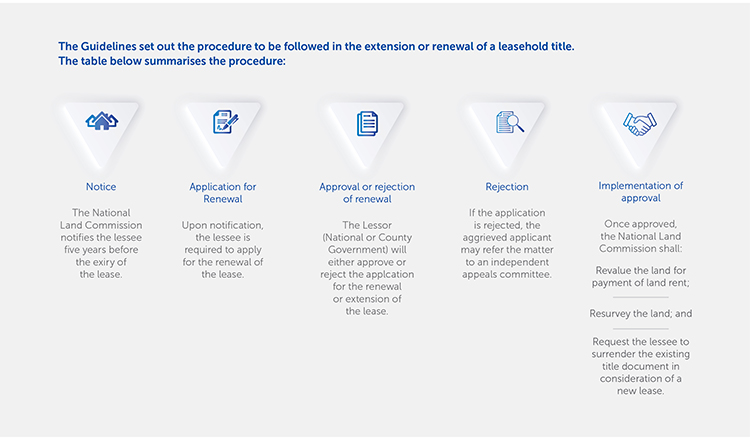Legitimate expectation in renewal of a leasehold title
At a glance
- Land tenure in Kenya is classified as either freehold or leasehold, with leasehold being an interest in a property for a specific period subject to payment. Long-term leases are considered if the lease period exceeds 21 years.
- The Land Act 2012 empowers the National Land Commission to make rules on the renewal or extension of leases, providing a procedure to be followed.
- In a recent court case, the court ruled that current occupiers of leased properties have a legitimate expectation of lease renewal if they have complied with the terms of the lease and have developed the property. The duty to renew a lease is an administrative function that should be carried out fairly and justly.
Land tenure for private land in Kenya is mainly classified into either freehold interest or leasehold interest. A freehold interest allows the unlimited right to use and dispose of land in perpetuity subject to the rights of others and the regulatory powers of the National Government, County Government and other relevant state organs. A leasehold interest, on the other hand, is an interest in a property for a specific period subject to payment of a fee or rent to the lessor. If the period of the leasehold interest exceeds 21 years then the land is deemed to have been acquired through a long-term lease.
This alert focuses on long-term leases and the right of the current occupier of a property to renewal of the lease upon expiry of the lease term.
Guidelines for extension and renewal of leases
The Land Act 2012 gives the National Land Commission the power to make rules on the procedure for renewal or extension of leases and this was done through the guidelines for the extension and renewal of leases published in Kenya Gazette notice number 5734 of 2017 (Guidelines).
The Guidelines set out the procedure to be followed in the extension or renewal of a leasehold title. The table below summarises the procedure:

Challenges in renewal or extension of leases
Although the Guidelines set out the procedure for applying for the extension and renewal of leases, there has been some uncertainty on whether the right to an extension of a lease exists, as there was no uniform decision from the courts. The Environment and Land Court at Eldoret recently addressed this question in the case of Republic v National Land Commission and Two Others ex parte Ravindra Ratilal Taylor (Suing as the Trustee Uasin Gishu Arts Society of Eldoret) and Three Others; C.E.C Land Housing and Physical Planning Uasin Gishu County and Another (Interested Parties) [2022] eKLR (Arts Society of Eldoret).
Legitimate expectation in renewal of leases
In Arts Society of Eldoret, the arts society was allocated the property to construct and operate a cultural center through a grant issued on 5 May 1959, for a term of 49 years that lapsed in 2008. The Uasin Gishu Arts Society of Eldoret constructed and operated a theatre and a private restaurant on the property.
Upon expiry of the lease term, the arts society claimed that it had initiated the renewal of the lease term before its expiry and its renewal application had been recommended for renewal by the then District Planning Officer of the Municipal Council of Eldoret. Despite the recommendation and protests by the society, the National Land Commission and the County Lands Registrar for Uasin Gishu County forcefully took over the property without a court order and advertised to the public to apply for a lease over the property.
The arts society asserted that it had pre-eminent rights of renewal of the lease over the property since it had met all its obligations under the lease. On the other hand, the National Land Commission and the County Lands Registrar objected, stating that the society filed its renewal application after the expiry of the lease and submitted that the timing was in contravention of the mandatory terms applicable to lease renewal applications.
In ruling in favour of a legitimate expectation of renewal of a leased property, the court held that:
- a former holder of a government leasehold title, who has complied with the terms of the lease, holds a legitimate expectation that the lease will be renewed to them;
- despite there not being any explicit provisions regarding the renewal of leases of developed plots, such plots need to be renewed to their previous leaseholders unless the leaseholders have breached a fundamental term of the lease or are no longer interested in the lease; and
- exercise of the duty to renew a lease is an administrative function which is accompanied by the obligation to act in a fair, just and proportionate manner, and it would be fair, just and equitable to renew the lease in favour of the incumbent holder of the lease.
Therefore, the legitimate expectation of renewal of a lease is a right held by the current occupier of the property (the lessee). However, this right is subject to the lessee complying with the terms of the lease and they are in a stronger position to accrue this right if they have developed the property.
The information and material published on this website is provided for general purposes only and does not constitute legal advice. We make every effort to ensure that the content is updated regularly and to offer the most current and accurate information. Please consult one of our lawyers on any specific legal problem or matter. We accept no responsibility for any loss or damage, whether direct or consequential, which may arise from reliance on the information contained in these pages. Please refer to our full terms and conditions. Copyright © 2026 Cliffe Dekker Hofmeyr. All rights reserved. For permission to reproduce an article or publication, please contact us cliffedekkerhofmeyr@cdhlegal.com.
Subscribe
We support our clients’ strategic and operational needs by offering innovative, integrated and high quality thought leadership. To stay up to date on the latest legal developments that may potentially impact your business, subscribe to our alerts, seminar and webinar invitations.
Subscribe




